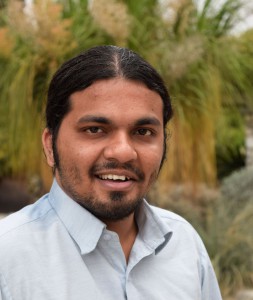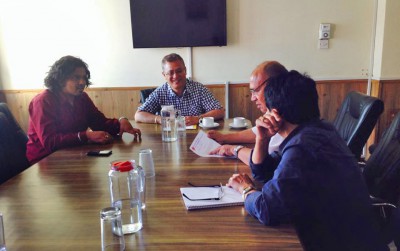 Sumesh Shiwakoty ’18 thinks big. An international student from Nepal, Shiwakoty wants to change the world through global initiatives that tackle issues ranging from climate change to nuclear proliferation. This summer, he took on a problem close to home—8,000 miles from Claremont.
Sumesh Shiwakoty ’18 thinks big. An international student from Nepal, Shiwakoty wants to change the world through global initiatives that tackle issues ranging from climate change to nuclear proliferation. This summer, he took on a problem close to home—8,000 miles from Claremont.
After receiving a 2015 Andrew W. Mellon Foundation Environmental Analysis Fellowship for Summer Research, Shiwakoty traveled to Nepal to research the implementation of building codes in his country, both before and after the devastating earthquakes in April.
“When natural catastrophes hit, we need to be prepared,” Shiwakoty said.
Associate Professor of Environmental Analysis Brinda Sarathy, director of Pitzer’s Robert Redford Conservancy and Shiwakoty’s faculty mentor, said she knew from the moment Shiwakoty walked into her office to propose the project that his research would be both important and timely.
“Not only had his family and community been personally impacted by the earthquake, but Sumesh was actively looking for policy solutions,” Sarathy said.
Shiwakoty, who writes commentaries for Nepali newspapers, drew on connections in his home country and interviewed a wide range of people from various political, governmental, economical, technical and environmental backgrounds—including a former prime minister of Nepal.
“Given Sumesh’s networks among high-ranking government officials and journalists, he was able to hit the ground running,” Sarathy said. “How many Pitzer students would have access to the former prime minister of a nation for a one-on-one interview about earthquake safety?”
 Sumesh Shiwakoty ’18 (left) meeting with UN-Habitat officials and business stakeholders in Nepal.
Sumesh Shiwakoty ’18 (left) meeting with UN-Habitat officials and business stakeholders in Nepal.
When Shiwakoty returned to California, he interviewed officials about the way the state—which, like Nepal, is sitting in a seismically active zone—handles its building infrastructure. He integrated his findings from both Nepal and California into a 17-page report. His conclusions stress the importance of creating institutional capacity in Nepal, a country still recovering from a 10-year civil war that ended in 2006.
Shiwakoty hopes to publish his report in a Nepalese newspaper to help educate people about the need to enforce building codes as the country rebuilds. Now a sophomore at Pitzer, Shiwakoty is looking for new challenges in the arenas of international relations and environmental policy research.
“I want to learn in order to change things,” he says. “In the end, I’m going to make change happen.”